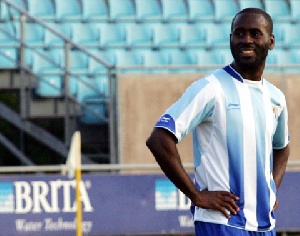Football is full of stories of players who were destined for big things but never realised their potential and Quincy Owusu-Abeyie is no different. Back in 2005, he and Lionel Messi were the stars of the U20 World Cup, 12 years later and one is dominating world football whilst the other is without a club.
Argentina emerged from the 2005 U20 FIFA World Cup victorious. It was during that tournament that Lionel Messi announced himself to the world and became a household name, with a series of dazzling displays of the quality that we have come to expect from the silky forward.
Hosts Holland went into the tournament with a number of players who would go on to play at the highest level, players such as; Ibrahim Affellay and Ryan Babel. But there was also a certain Quincy Owusu-Abeyie among their squad, who despite having yet to turn 20 already had spells at Ajax and Arsenal on his CV.
Quincy quickly showed what both those sides saw in him and despite only scoring one goal, his impressive performances, fuelled by his pace and directness, caught the eye. Though his performances weren't enough to prevent Holland from being knocked out in the quarter-finals by eventual finalists Nigeria. Messi, for his part, went on to win the Player of the Tournament and Gold Boot awards.
During his time at Malaga, Owusu-Abeyie gave an interview to 'Malaga Hoy' discussing his career and the ups and downs he has experienced.
"So back in 2005 you were on the books at Arsenal and playing in an U20 World Cup with Holland in which you and Lionel Messi were the stand-out players," the publication opened by saying. "Yes, and look where we both are now..." replied the former Ghana international whilst trying to hold back his laughter.
So why did Messi win Ballon d'Ors and Quincy not? "Ufff... well as you can imagine I've asked myself that a lot. I still dream about that moment, about that tournament to this very day. I was in the best form of my career at that point, I hope that one day I can perform to that level on a consistent basis. Why didn't I carry on in the same vein? It's not easy, it's not an easy question to answer... I still believe that one day I will get back to that level," he explained.
Quincy continued to show his erratic nature both on and off the pitch during his time on the Costa del Sol. From excellent performances on the pitch in a 5-3 win against Real Zaragoza and a 5-3 defeat to Sevilla, to outbursts off it, which eventually led to Manuel Pellegrini moving the player on.
The forward admits that he made errors as a youngster, but he did not accept how the press in his homeland never let him forget his mistakes and thus declared internationally for Ghana. He was part of the 'Black Stars' squad for the 2010 World Cup in South Africa, though he barely featured.
Ill-disciplined, problematic, explosive... When Quincy gave this interview he had already had spells at nine clubs in his career: Ajax, Arsenal, Spartak Moscow, Celta, Birmingham, Cardiff, Portsmouth, Al-Sadd and Málaga.
He now admits that his decision to join Spartak was a bad one. He left Arsenal, who were enjoying their glory days having gone the 2003/04 Premier League season unbeaten and competed in the Champions League final in 2006 to make the move East in a switch that was largely motivated by money.
"Wenger trusted in me, they had an incredible squad, the year I left they played in the Champions League final. The Spartak option was good for the club financially and for me it was outstanding. I was ambitious and sometimes you think about money a little more than you should... It's easy to say that now but at the age of 20 you just see that amount of money and your eyes light up... But you can't turn the clock back, it's a shame," he reflected. "Wenger was the best manager I worked under, he always told you what you were doing wrong but in a constructive way," Quincy added.
Little by litte Quincy lost his way, spells at Panathanaikos, Boavista and NEC Nijmegen followed, before he was released by the latter in January 2017 after a spat with the manager.
What could have been.
Sports News of Thursday, 30 November 2017
Source: besoccer.com

















